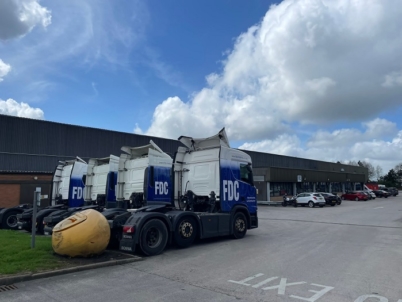-
Nutrivend selects Forterro’s Orderwise to support online expansion and streamline operations - April 11, 2025
-
ARROWXL LAUNCHES AMBITIOUS ZERO WASTE ROADMAP - April 8, 2025
-
THE BCMPA’S NEW CAMPAIGN DRIVES OUTSOURCING SUCCESS IN Q1 - April 7, 2025
-
BLACKOUT TECHNOLOGIES TARGETS TELEMATICS-INTEGRATED MOBILE DEVICE BLOCKING TO COMBAT SMARTPHONE DISTRACTION - April 1, 2025
-
OpenADR Alliance announces first OpenADR 3.0 certified products with EVoke Systems, E.ON Energy and Universal Devices - March 25, 2025
-
Growing fulfilment and contract packer appoints new Managing Director - March 25, 2025
-
When is it time to invest in a WMS? Understanding the key trigger points - March 25, 2025
-
eCapital helps Vantage Recruitment on its journey to financial success - March 24, 2025
-
Hugo Beck Celebrates 70 Years of Packaging Innovation with Open House Events - March 20, 2025
-
PROLOG FULFILMENT SUPPORTS LUNA DAILY’S COMMITMENT TO BETTER BODY CARE FOR ALL WOMEN - March 19, 2025
Internet retailers and other companies that import products from the Far East to the UK are facing major supply chain disruption and increased logistics costs as a result of a global shortage of shipping containers.
The scarcity of containers has pushed up shipping prices to near record highs: by the end of 2020, the cost of shipping goods from China to Northern Europe – one of the most popular trade routes – had quadrupled from levels at the start of the year.
“The container crisis is increasing the pressure on British retailers and manufacturers at a time when businesses are already having to contend with the impact of Brexit and the pandemic on their profitability,” says Charlie Walker, head of marketing at leading e-commerce fulfillment and logistics solutions specialist, Walker Logistics.
He continues: “Many internet retailers are understood to be running out of stock of certain items while manufacturing firms have reported delays in production as a result of the difficulty of getting vital component parts from Asia.”
And it is not just imports from the Far East that are affected, as Charlie Walker explains: “There are stories of British internet retailers opting to burn large quantities of returned clothing stock originally sold to customers in mainland Europe because it is more cost efficient to dispose of returned goods that way than it is to pay for them to be freighted back to the UK,” he says.
The container shortage is partly a result of the increase in demand for shipping during the pandemic when online shoppers spent more on home improvements, furniture and products for their new home offices. The huge volume of personal protective equipment and medical supplies passing through the world’s ports has also been a contributory factor as has the fact that container production dipped dramatically at the height of the Covid pandemic as a result of worker absenteeism at the Chinese factories that turn out the majority of the global container stock.
And the problems created by the container shortage have been compounded by the fact that many of the container ships that transport goods from China and other regions in the Far East to markets in the west have been delayed at ports by Covid-related manpower issues as both port staff and ship’s crew members contracted the virus.
With blockages still building up in global trade lines, Charlie Walker advises any business that imports products from Asia to order their next consignment much earlier than they normally would if they want to give themselves the best chance of avoiding critical stock shortages.
“The pandemic has resulted in an unusually high demand for goods ordered online. With the logistical bottlenecks affecting imports of products or components from the Far East unlikely to ease until Covid vaccines have been rolled out across the world, UK businesses have to reassess their purchasing strategy,” he says.
Walker Logistics offers end-to-end air, sea road or rail freight forwarding services for a wide range of goods from anywhere in the world and the company’s freight forwarding specialists have extensive experience in transporting imports and exports to and from the UK – as well as providing support with fulfilment, warehousing, distribution and customs clearance.
































